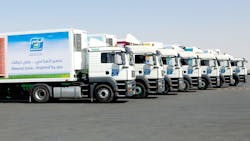Kevin Boydstun, director of operations at Sharp Transportation, had a driver pick up a load of bark in Utah in July 2016. Operations with that trailer were running smoothly for the next two months before it arrived at a food production facility and was rejected.
Close inspections found bark still lodged in the e-tracks of the trailer. It took the driver an hour and a half with a leaf blower to blow out the pile of bark before it was ready for food transportation.
"Embarrassing; Yes. But that's what we're up against," Boydstun said of the Food Safety Modernization Act (FSMA) in a Spireon webinar.
Because of FSMA, transportation food has another layer of regulations that don't necessarily effect other types of cargo. Fortunately though, the regulations were largely based off of best practices in the industry anyway, said Jon Samson, executive director, Agricultural & Food Transporters Conference, American Trucking Associations (ATA) in the webinar.
The FSMA was originally passed in 2011 in response to food borne illness outbreaks mainly steaming from processing and handling of food. Within this act is the Sanitary Transportation of Human and Animal Food, which has undergone changes in order to have "full regulation from farm to fork," Samson said. This went into effect in 2016.
The objective of the act is to prevent food from becoming unsafe, and this is done by regulating the following parts of the transportation process:
- Ensuring food is properly refrigerated with temperature control
- Vehicles and equipment, from refrigeration units to the pallets, are made from materials that can be properly cleaned and sanitized
- Ensuring food is properly protected and free from cross-contamination
- Transportation operations outside of the product-handling
- Recording keeping. Keep records of general process and procedures, and be able to provide information as need, but this does not include detailed reports. Detailed reports are only needed as shippers require on a case-by-case basis. This rule also eliminated the three-load rule.
- Training. The FDA offers a free one-hour web-based training on basic rules, although this is not mandated.
- Waivers.
Who is covered by FSMA regulations
All U.S. shippers, carries, loaders and receivers who engage in "transportation operations" of food must follow the Food Safety Modernization Act (FSMA). A person can fill multiple roles.
- Shipper - A person who arranges for the transportation of goods by a carrier, or multiple carriers. This includes anyone brokering out shipment for the shipper, and can include the food manufacturer, this is a change from the initial rule.
- Carrier - A person who physically moves food by rail or motor vehicle.
- Loader - A person that loads goods onto a motor or rail vehicle during transportation operations. This was added so that original shippers who have meet requirement are not liable for any new shipments that are taken off and reloaded at a cross-dock facility. For example: Once getting to a cross-dock facility, if half of the original product is unloaded and then another product is reloaded in its place, the loader is now responsible for meeting the requirements, including the trailer cleanliness and ensuring everything is working properly.
- Receiver - Any person who receives food at a point in the transportation.
Who is not covered by FSMA regulations:
- Small businesses with less than $5000,000 in annual revenue (average over three years).
Jon Samson of ATA noted that this was of interest because in the preamble there were a couple studies mentioned as to why the rules were written. The studies linked several food borne-related issues to "smaller box trucks," which are now exempt from these rules.
"They did want to have some sort of small business carve out," he said.
- Goods transshipped through the U.S. FSMA does, however, cover all good manufactured in the U.S., a change from the initial rule.
- Food from a facility that is already regulated by the USDA. (Example: eggs, poultry, meat products).
- Farmers performing all transportation operations.
Food not covered by FSMA regulations
- Food completely enclosed by a container that is not temperature controlled for safety. Frozen food is exempt with the explanation that carrier gets to a receiver and the product is supposed to be frozen and no longer is, they'll reject it on quality before it even gets to the safety concern.
- Compressed food gases.
- Human food byproducts transported for animal feed and not subject to further processing.
- Live animals.



